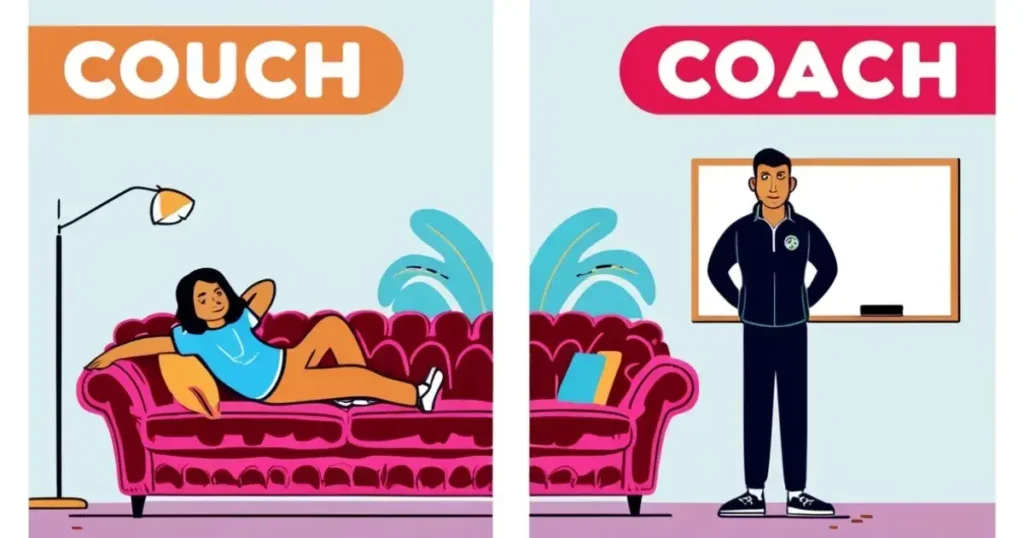The English language is full of words that sound similar, yet have completely different meanings, leading to confusion for many speakers. “Couch” and “coach” are two such terms that are often mistakenly interchanged, especially in casual conversations. While they might sound alike and even have overlapping contexts, they serve distinct purposes in both the written and spoken word. In this article, we will dive deep into the couch or coach debate, clarifying their definitions, usage, and providing useful examples to help you confidently choose the right word in different scenarios.
Couch or Coach Difference
Have you ever wondered whether to say “I’m going to sit on the coach” or “I’m going to sit on the couch”? This simple question can easily lead to confusion for many people, as “couch” and “coach” are often mixed up due to their similar pronunciation. Understanding when to use each of these words can make a significant difference in your communication.
In this article, we’ll clarify the distinctions between couch and coach, explore their meanings, and help you understand the couch or coach difference in both everyday conversation and specific contexts, such as sports and furniture. Let’s dive into the world of couch or coach!
Quick Answers:
- Couch refers to a piece of furniture for seating or lounging.
- Coach refers to a mentor or instructor, especially in sports, or a mode of transportation like a bus or carriage.
Definitions and Usage
Let’s begin by looking at the exact definitions of couch and coach to understand their distinct roles.
Couch:

- Definition: A couch is a piece of furniture, typically used for sitting, lounging, or lying down, usually found in living rooms or lounges. It’s designed for comfort and relaxation, providing ample seating for individuals or groups.
- Origin: The word couch comes from the Old French term “couche,” which means a place to lie down. The word eventually evolved to refer to the modern piece of furniture we now use for relaxation.
- Grammatical Role: The word “couch” is most commonly used as a noun. It refers to the object used for sitting or resting. It can also sometimes be used as a verb, meaning to express or phrase something in a particular way (e.g., “He couched his proposal delicately”).
Example Usage:
- I spent the afternoon relaxing on the couch watching movies.
- The couch in my living room is very comfortable and perfect for naps.
- She couched her feedback in a constructive manner.
Coach:

- Definition: A coach refers to a person who trains, mentors, or instructs others, particularly in sports or personal development. It can also refer to a vehicle designed for long-distance travel, such as a bus or train.
- Origin: The word coach comes from the Latin word “cocca,” which referred to a large, horse-drawn carriage. Over time, the word was adopted into English, first to refer to the vehicle and later to refer to a person who transports or trains others.
- Grammatical Role: The word “coach” can be used as a noun (the person or vehicle) or a verb (the act of coaching or training someone). In sports, a coach is responsible for guiding the team’s training, strategy, and overall performance.
Example Usage:
- The coach helped the team improve their performance by focusing on teamwork.
- She’s hired a coach to help her with career development.
- I’ll be traveling by coach to the city for the conference.
Synonyms
Understanding the synonyms of couch and coach can also help you get a better grasp of their meanings and use cases.
Couch Synonyms:
- Sofa
- Lounge
- Sectional (couch)
- Divan
- Settee
- Armchair (in some contexts)
- Recliner (similar, though different in style)
- Ottoman (when part of a set)
- Futon
- Chaise longue
Coach Synonyms:
- Mentor
- Trainer
- Instructor
- Guide
- Teacher
- Facilitator
- Advisor
- Counselor
- Consultant
- Sports coach
Couch Or Coach: A Comparison Table
To make the distinctions between couch or coach even clearer, here’s a side-by-side comparison of both terms:
| Aspect | Couch | Coach |
|---|---|---|
| Definition | A piece of furniture used for seating | A person who trains or instructs others |
| Grammatical Role | Noun (furniture) or verb (to express) | Noun (person or vehicle) or verb (to train) |
| Common Contexts | Living room, relaxation, seating | Sports, business, personal development, travel |
| Primary Use | Comfort and leisure | Instruction, guidance, and mentorship |
| Pronunciation | /kaʊtʃ/ | /koʊtʃ/ |
| Synonyms | Sofa, sectional, lounge | Mentor, trainer, instructor, guide |
When to Use Each Term
Choosing the right word between couch or coach depends on the context. Here’s a guide to help you decide:
Use Couch When:
- Referring to a piece of furniture.
- Talking about a place to relax or sit comfortably.
- Describing seating in a living room, lounge, or other informal settings.
- Using a verb like “to couch” meaning to phrase or express something.
Example Sentences:
- The couch in my office is perfect for reading.
- I like to curl up on the couch after a long day.
Use Coach When:
- Referring to a trainer or mentor in a professional or sports context.
- Talking about someone who helps others develop skills or improve performance.
- Discussing a mode of transportation, such as a train coach or bus coach.
Example Sentences:
- The coach worked with the team on their fitness and stamina.
- I’ve hired a coach to help me with my business strategies.
Everyday Usage Examples
Let’s explore some everyday usage examples to further clarify the differences between couch or coach in common scenarios.
Couch Usage Examples:
- After work, I always unwind on the couch with a cup of tea.
- The new couch we bought fits perfectly in the living room.
- I spent the weekend lounging on the couch, binge-watching my favorite show.
Coach Usage Examples:
- The coach instructed the athletes on how to perfect their technique.
- A life coach can provide you with the tools to improve both your personal and professional life.
- As a coach, she emphasized the importance of teamwork and strategy.
Couch vs Coach: Pronunciation

Pronunciation is one area where couch vs coach can create confusion. While these words are spelled similarly, their pronunciation differs slightly.
- Couch is pronounced as /kaʊtʃ/, with a diphthong (ow) sound.
- Coach is pronounced as /koʊtʃ/, with a long “o” sound.
It’s important to distinguish between these pronunciations to avoid mixing them up, especially in spoken language.
Examples of Contexts Where “Coach” Is Used
Sports:
A coach is a person who trains athletes or teams, guiding them to improve their performance. They analyze strategies, provide feedback, and motivate their players to reach their potential.
Business:
In business, a coach is someone who helps individuals or organizations achieve their goals. Whether it’s leadership, communication, or team dynamics, a business coach provides direction and expertise.
Education:
A coach in education might be a tutor or mentor who helps students develop specific skills, from academic subjects to personal growth, providing one-on-one support and guidance.
Travel:
A coach can also refer to a large vehicle used for long-distance transportation, such as a bus or train carriage. It’s a comfortable option for traveling over extended distances.
Understanding the Role of a Coach
How Important is the Role of a Coach?
A coach plays a pivotal role in providing structure, guidance, and expertise to individuals or teams. Through motivation and skill development, coaches impact their athletes’ skills, mindset, and overall performance, fostering both personal and collective growth.
Coaching in Individual Sports vs. Team Sports
In Individual Sports:
In individual sports, a coach focuses on personal development, refining technique, and building mental toughness. The coach’s role is more individualized, addressing specific skills and strengths. Examples include sports like tennis, gymnastics, and swimming.
In Team Sports:
In team sports, the coach emphasizes strategy, teamwork, and collective goals. They help manage group dynamics, ensuring players work together toward a common objective. Examples include football, basketball, and soccer.
30 Examples for Both “Couch” and “Coach”

Couch Examples:
- I’m relaxing on the couch after a long day.
- The couch in the living room is really comfortable.
- We need a new couch; this one is falling apart.
- She curled up on the couch with a good book.
- He spilled coffee all over the couch cushions.
- My couch needs a cleaning.
- The couch has enough space for everyone.
- I prefer to sit on the couch, not the chairs.
- This couch matches the decor perfectly.
- After dinner, everyone sat on the couch to watch TV.
- We bought the couch from a local furniture store.
- The couch is positioned by the window.
- She flopped down on the couch after a stressful day.
- The dog loves lying on the couch.
- The couch is great for napping on lazy weekends.
- My couch has built-in cup holders.
- A sectional couch works better for large families.
- This couch was a gift for our anniversary.
- The couch’s fabric feels soft and smooth.
- He sank into the couch, exhausted from the workout.
Coach Examples:
- The coach gave us a pep talk before the game.
- He’s been my coach for two seasons.
- She’s an excellent coach who knows how to motivate her players.
- The coach called a timeout to discuss strategy.
- I hired a career coach to help with my job search.
- The coach helped the team improve their defense.
- We’re meeting with a leadership coach next week.
- His coach advised him to focus on his fitness.
- A coach can help you develop your skills faster.
- The coach pushed us to work harder in practice.
- She’s not just a coach, but also a mentor.
- The coach analyzed the match and gave feedback.
- He wants to become a coach in the NFL.
- The coach encouraged the players after their loss.
- We traveled by coach to the away game.
- She’s a coach for an online course on public speaking.
- The coach led the team to the championship.
- A great coach understands both the mental and physical aspects of the game.
- He became a coach to share his passion for the sport.
- The coach’s strategies made a big difference this season.
- After working with a fitness coach, she lost 15 pounds.
- The business coach helped him build a more efficient team.
- His coach gave him specific drills to improve his endurance.
- As a coach, you have to adapt to each player’s strengths.
- The coach of the year award was well-deserved.
- A good coach knows when to push and when to back off.
- He became a coach after retiring from professional sports.
- The coach suggested a new training regimen.
- They’re hiring a new coach for the high school basketball team.
- The coach has a reputation for being tough but fair.
Why People Love Their Coaches
Personalized Support:
Coaches offer tailored guidance, understanding each individual’s needs and strengths to create effective development plans.
Motivation and Inspiration:
A coach motivates their clients or athletes to push beyond their limits, providing constant encouragement and support.
Accountability and Results-Oriented Approach:
Coaches help keep clients on track, ensuring they stay focused on their goals and timelines, offering regular feedback and tracking progress.
Expertise and Experience:
Coaches bring a wealth of knowledge and experience, having often been successful in their own fields. They share this expertise to guide others toward success.
What Does a Coach Do in Business?
Leadership Development:
A coach helps business leaders improve their communication, decision-making, and leadership vision, fostering growth and direction within the company.
Goal Setting and Strategy:
Coaches assist in setting realistic, measurable goals for both individuals and teams, helping them create actionable plans to achieve success.
Team Building:
A coach can facilitate team-building exercises to improve collaboration, trust, and synergy, leading to enhanced group performance.
Performance Management:
A business coach works with individuals and teams to increase productivity and address performance issues.
Conflict Resolution:
Coaches mediate conflicts within teams or organizations, ensuring a positive and productive work environment.
Couch Materials: What Makes a Good Couch?

Common Materials for Couches:
Couches come in various materials, including leather, fabric, microfiber, and velvet, each offering unique benefits. Leather is durable and luxurious, while microfiber is soft and stain-resistant.
Wood vs. Metal Frames:
- Wood Frame:
- Advantages: Classic look, sturdy, and durable.
- Disadvantages: Can be heavy and less flexible.
- Metal Frame:
- Advantages: Lighter, modern aesthetic, and more flexible.
- Disadvantages: May lack the warmth and charm of wood.
Understanding the materials and structure of a couch is essential for choosing the right one for your home. Whether you prefer a wooden or metal frame, each offers distinct features that cater to different preferences and needs.
Couch Or Coach Perfume and Other Odd Uses
Sometimes, the term couch or coach pops up in unexpected places. For example, couch or coach perfume might seem confusing, but it’s simply a playful use of the words in different contexts. A coach perfume, for instance, refers to a fragrance line by the popular luxury brand, Coach.
Similarly, couch olx refers to listings of couches for sale on OLX, a marketplace platform.
Conclusion
To wrap up, the confusion between couch or coach is understandable due to their similar sounds, but by remembering their distinct definitions and usage contexts, you can use these words correctly. The couch is associated with furniture and comfort, while the coach is a mentor or trainer who helps others improve. Whether you’re discussing couch furniture in your living room or hiring a coach for sports training, knowing when to use each term is crucial.
By now, you should feel confident in using couch or coach appropriately in any conversation or writing scenario. Whether you’re talking about relaxing on a couch or training with a coach, your audience will appreciate your clear communication!

This author is a passionate linguist and grammar enthusiast, dedicated to helping individuals master the art of language. With years of experience in teaching and editing, she brings clarity and precision to every sentence. Tina’s mission is to empower writers of all levels to express themselves with confidence and excellence.

![Couch Or Coach: Differences + Usage + Examples [2025]](https://verbexa.com/wp-content/uploads/2025/01/couch-or-coach-differences-usage-examples-2025.webp)